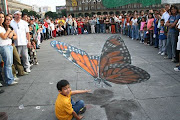By one statistic I heard in the lead up to this 2009 Memorial Day, WWII veterans are now dying at the rate of about a thousand per day. It's sobering by itself but inevitably also makes you flash ahead to that time coming when no one is left from the era of the last "Great War." The time is not too far off when few Vietnam Vets who will still be able to shuffle along in the processions and parades will be pushing their elderly commanding officers in wheelchairs, and those now dying in Iraq and Afghanistan will be honored by their great grandchildren.
How many lives of those born this year will be memorialized on the twentieth and later anniversaries of Memorial Day 2009? Whatever names will be given to the future military actions whose dead will be remembered then, how long will it be before our gestures of gratitude and respect - for those we will have sent to early graves in battles today and yet to come - can be felt with no need to rationalize that gnawing sense of the ultimate futility of waging these wasteful senseless wars?
Remembering our losses, what can we say we have gained in Iraq and Afghanistan, or for that matter, Vietnam?
Kurt Vonnegut was once questioned about his sentiments behind those brilliant semi-biographical fantasies he wrote like Slaughterhouse Five, which included many references to his real-life experiences as a soldier and prisoner of war during the last Great War. He was asked if the recurring critically satirical themes of his novels should be taken as anti-war statements? Surprisingly, he objected to the idea that he may have been constitutionally anti-war.
While Vonnegut acknowledged the absurdity of war he also considered it absurd and useless to be opposed to it as a matter of practicality. To be anti-war would be as pointless as to be opposed to tides, he said.
Maybe he was right. Humans as a group seem to be as capable of avoiding war as we are of stopping the ocean tides. It seems to be a compulsion of our collective nature. Throughout my life - which began not so long after World War II, there have been continual wars on the planet and not one of them has proven necessary, productive or, least of all, by any means "great."
On Memorial Day, we may accept that war is inevitable, but do we think there will ever be another "Great War" to remember?
Is that really something we should be hopeful for?
It would be shameful to say that we yearn for the next "Great War," if only to assuage our conflicted emotions that surface on these morbid holidays each year. But we must be looking forward to just such an eventuality.
We revere our troops and military machinery and we tithe with extreme monetary obligation to the Pentagon on high as though we believe that someday they will deliver our salvation. Only in this context I think that this reverence for our saviors in uniform is what compels the true believers among us to be so faithfully committed to maintaining the false ideal of the military's moral purity.
The desire to hold our troops to standards beyond what is acceptable in civil society seems the only rational basis for rejecting otherwise good and honorable servicemembers who are known to possess the human "flaw" of an inclination toward homosexual gratification. Only it's not rational. It is, in fact, as absurd to be anti-gay as it is to be anti-war. And for the same reason.
As long as people are sexual, we will be homosexual. As long as there is a military, there will be homosexuals in the military. Always have been, always will be.
"There you go - disrespecting the military again. Throwing sex in where it don't belong! Especially on this solemn occasion of Memorial Day! Why do you have to bring up queers on this solemn occasion, boy? The dead don't have sex. It's disrespectful and totally irrelevant!"
Which is, of course, the point.
Statistically, we can surmise that among those who die in service of our country, there are and will be a number of homosexuals. One study conducted by the Servicemembers Legal Defense Network after the 2000 Census, estimated that 2.5% of active military personnel were exclusively homosexual.
It may be safe to apply that seemingly low figure to our heroes and casualties of all past wars as well as those to come. In recent years, especially since "Don't Ask, Don't Tell," had those gay dead troops survived and later been found out, they would have been humiliated, their careers condemned and they would be discharged abruptly and unceremoniously.
As it is, having given the ultimate sacrifice alongside their straight comrades before taking a chance on coming out, they are honored for once without discrimination. By their deaths, the truth of their and honor and sacrifice in equal measure to all our other dead soldiers cannot be denied or abrogated.
Ironically, it is only after they've "given their last full measure of devotion" that the irrelevance of their sexuality may finally be acknowledged.
It is the lot of those gay men and women heroes that survive even the harshest of battlefield conditions to later face the judgement of a cynically ungrateful and disrespectful policy of expulsion on the grounds of "moral inferiority."
All those who died in service to our country are generally memorialized with a reverence accruing to the fallen as a group.
I guess when they're dead it's just up to God to sort them out.
Gay Men & Lesbians in the US Military: Estimated from Census 2000









No comments:
Post a Comment